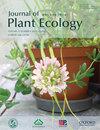Soil P solubilization and plant growth promotion by a saline-alkali-tolerant P-solubilizing bacterium, Bacillus sp. DYS211
IF 3.9
2区 环境科学与生态学
Q2 ECOLOGY
引用次数: 0
Abstract
Abstract High total P content but insufficient available P in soil is an obstacle that restricts the efficient utilization of P in saline-alkali soil regions. Although saline-alkali resistant P-solubilizing bacteria (PSB) solubilize insoluble P, few studies have focused on their application in plant growth. We isolated a PSB strain, identified as Bacillus sp. DYS211, from bird droppings in saline-alkali regions and determined its growth characteristics and resistance to salt and alkalis. To investigate the effect of PSB on the germination and growth of plant seeds, we performed a potting experiment using Suaeda salsa with PSB added. The PSB strain grew rapidly in the first 12 h, and the solubilized P content from PSB reached a maximum of 258.22 mg L -1 at 48 h. Saline-alkali tolerance and P-solubilizing ability tests showed that Bacillus sp. DYS211 preferred to dissolve inorganic P, was halophilic, and had a good P-solubilizing effect at 1%‒8% salinity (available P >150 mg L -1). It exhibited good P solubilization abilities when glucose and sucrose were used as C sources or when ammonium sulfate, ammonium nitrate, or yeast extract powder were used as N sources. In the growth promotion test, PSB increased seed germination, particularly under high salinity stress, with a growth-promotion of 8.33%. The PSB also improved the growth of S. salsa, including plant height and biomass (up to three times) under both saline and alkaline conditions, and the stem diameter increased under high salinity stress. This strain demonstrates potential for vegetation restoration in saline-alkali regions.耐盐碱增磷菌DYS211对土壤增磷和植物生长的促进作用
土壤全磷含量高而速效磷不足是制约盐碱地土壤磷有效利用的障碍。虽然耐盐碱增磷菌(PSB)可以增溶不溶性磷,但很少有研究关注其在植物生长中的应用。从盐碱区鸟类粪便中分离到一株PSB,鉴定为Bacillus sp. DYS211,并对其生长特性和对盐碱的抗性进行了测定。为研究PSB对植物种子萌发和生长的影响,采用添加PSB的盐田盆栽试验。PSB菌株在培养前12 h生长迅速,48 h溶磷量最大,达到258.22 mg L -1。耐盐碱性和增磷能力试验表明,DYS211芽孢杆菌倾向于溶解无机磷,为嗜盐菌,在1% ~ 8%盐度(可溶P >150 mg L -1)条件下具有良好的增磷效果。以葡萄糖和蔗糖为C源,以硫酸铵、硝酸铵、酵母浸膏粉为N源,均表现出较好的增磷能力。在促生长试验中,PSB对种子萌发有促进作用,特别是在高盐胁迫下,促进率为8.33%。在高盐胁迫和高碱胁迫下,PSB均能显著提高盐沙菌的株高和生物量(最高可达3倍),且高盐胁迫下茎粗增加。该菌株显示了在盐碱区植被恢复中的潜力。
本文章由计算机程序翻译,如有差异,请以英文原文为准。
求助全文
约1分钟内获得全文
求助全文
来源期刊

Journal of Plant Ecology
生物-植物科学
CiteScore
4.60
自引率
18.50%
发文量
134
审稿时长
3 months
期刊介绍:
Journal of Plant Ecology (JPE) serves as an important medium for ecologists to present research findings and discuss challenging issues in the broad field of plants and their interactions with biotic and abiotic environment. The JPE will cover all aspects of plant ecology, including plant ecophysiology, population ecology, community ecology, ecosystem ecology and landscape ecology as well as conservation ecology, evolutionary ecology, and theoretical ecology.
 求助内容:
求助内容: 应助结果提醒方式:
应助结果提醒方式:


